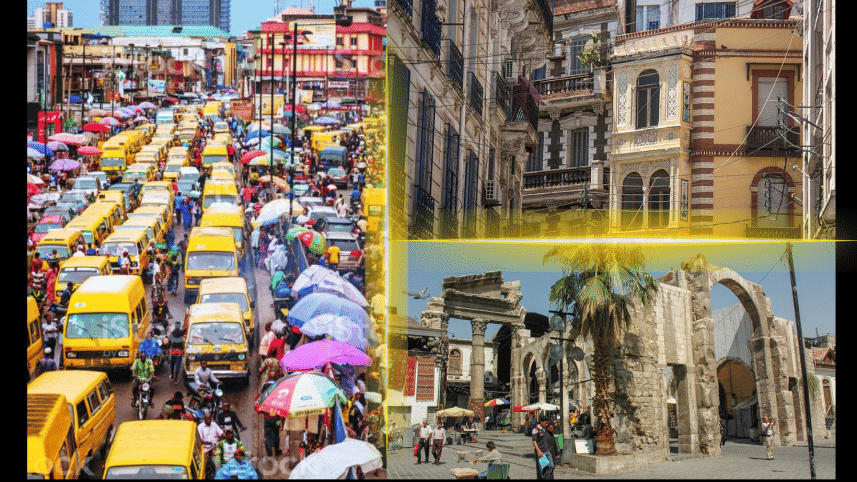Top 5 worst liveable cities in 2023

The Economist Intelligence Unit (EIU), established in 1946, is one of the top organisations in forecasting several global phenomena, such as democracy, economic outlook, operation and risk analysis, etc. Most recently, EIU published its report on Global Liveability Index, analyzing 173 cities of the world into 5 categories: stability, healthcare, education, culture and the environment, and infrastructure.
While the report as a whole show significant and in some cases, unprecedented improvement in many cities, EIU has identified the following 5 as the worst cities to live in as of 2023:
Damascus, Syria
It comes as no surprise that the capital of Syria has ranked as the worst liveable city in the world. Plagued by years of brutal warfare, sense of security and stability are now a thing of the past in Damascus.
Education has suffered greatly due to schools and universities being closed down. Following the mass destruction of hospitals, the healthcare sector is struggling everyday to cope with the influx of patients. Infrastructural damage has led to severe disruption of waste management systems, further worsening environmental degradation and pollution.
Tripoli, Libya
Political unrest has affected a number of liveability factors in Tripoli, Libya.
The education sector has been devastated with several schools facing closure and the remaining suffering greatly from lack of funds to cover the basic operational costs. On the other hand, severe shortage of medical supplies, limited access to primary healthcare, and underfunding of infrastructure pose serious problems for the healthcare system of the city.
Corruption and civil unrest have further exacerbated the security and stability in Tripoli, placing it among the worst liveable cities in Global Liveability Index.
Algiers, Algeria
Algiers, the capital of Algeria, confronts several hurdles that contribute to its unfavourable liability status.
Although the EIU report improvements in healthcare and education in comparison to the preceding year, the limited number of education institutions in the city are still constantly dealing with overcrowded classrooms and outdated curricula. Healthcare facilities struggle with inadequate infrastructure, limited equipment, and a shortage of healthcare professionals. Pollution levels, particularly air pollution, also pose significant health risks.
While recent additions to public funding have helped improve infrastructure and public services, Algiers still has some major developmental challenges ahead in terms of ensuring quality life for the inhabitants of the city.
Lagos, Nigeria
Lagos, despite being a thriving economic hub of Nigeria, faces multitude of challenges in its quality of life.
A major portion of the population consists of school-goers. Unfortunately, the city lacks resources in terms of academicians, finance, as well as infrastructure to accommodate these students, which results in substandard education quality and overcrowded classroom. The healthcare facilities' inability to cope with the growing demand for service often results in long waiting times and very limited access to necessary medical services.
What's worse, the local authorities often respond to protests on social and political unrest by simply banning social media use or cutting off communication in some form, which really does nothing to reassure citizens of their rights.
Karachi, Pakistan
News about political unrest is nothing new for Pakistan's largest city, Karachi. However, the situation is far worse when it comes to social security, education, healthcare facilities, and environment degradation.
The growing gender discrimination continues to disrupt the country's growth potential, with lack of quality education being at the very root of the problem. Classrooms are overcrowded, teaching an outdated curriculum, that in no way challenges the young minds of society. Access to healthcare, especially in regards to mental health, is extremely limited which in turn, affects the quality of life in the city.
Lack of proper drainage and waste management leads to health hazards, often causing major inconveniences to the well-being of citizens. Despite being an economic powerhouse for the country, Karachi fails to ensure proper living standards for its inhabitants, thereby placing among the worst cities to settle in.
Although not among the bottom 5, Dhaka itself is not doing very well either. Barely beating Karachi and Port Moresby of Papua New Guinea, the capital of Bangladesh is the 7th worst liveable city, owing to its growing crowd, pollution, etc. The road to improvement is difficult, as it calls for immediate changes in both major and minor forms. However, it is imperative we start right away in order to make sure we do not drop further down this list.



 For all latest news, follow The Daily Star's Google News channel.
For all latest news, follow The Daily Star's Google News channel.
Comments